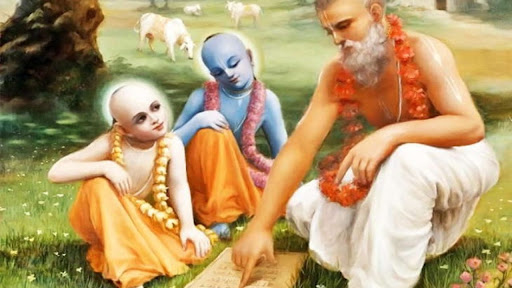Date/Time
Date(s) - July 21, 2024
Day(s) - Wednesday
Description – Guru (Vyasa) Purnima
This event really is directed towards Srila Vyasadeva, thus in some sampradayas they refer to Guru Purnima as Vyasa Purnima. Traditionally it is the day when the guru is worshipped.
Guru Purnima “……is observed on the full moon day in the month of Ashadha in honour of the sage Vyasa, by keeping a fast, worshippig him for His blessings and to gain wisdom. Formerly on this day, gurus who were the traditional teachers, were honoured by their pupils.
The river Beas is believed to have been so named as Vyasa practiced penance on its banks and compiled the four Vedas, the Mahabharat and the Eighteen Purana there. Since it is not possible for one man to have compiled so much in his life-time, and over a time span of a hundred years, it is believed that the name Vyasa must have been applied to many sages. Generally speaking, the name Veda Vyasa is applied to Krishna Dwaipayana who was the son of Satyavati and the sage Parasa – this is before Satyavati married King Shantanu of Mahabharata fame.”
Some Brief Information About Srila Vyasadeva.
“When the second millenium (‘Dwarpa Yuga’) overlapped the third (‘Treta Yuga’), the great sage Srila Vyasadeva was born to Parasara Muni in the womb of Satyati, the daughter of Vasu (the fisherman).” (Srimad Bhagavatam 1:4:14.).
In Srila Vyasa’s childhood he was called Krsna, because of his dark complexion, and because he was born on an island at the confluence of the Sati and Mati Rivers he was called Dwaipayana. After dividing the Vedas he got the name Veda Vyasa.
The following is the story that we just touched upon mentioning how Srila Vyasa came to make His appearance.
Once the hermit Parasara became attracted to a fisher girl of the name Matsya-Gandha who was found inside a fish. (The fish was actually a celestial maiden named Adrika who conceived two children by collecting the semen of the King of Chedi when his semen had fallen into the water of a river after seeing two animals engaged in coitus.) Parasara Muni asked the beautiful Matsya-Gandha, so named because of her fishy aroma, to take him in her boat from one side of the river to the other, but the beauty of this damsel, her bodily movements from the rowing, aroused lusty desires in Parasara. When he sat close to her she moved away, and asked him not to violate her chastity, but Parasara Muni being already too far carried away, created an artificial fog on the river and seduced her right there in the boat. He then created an island in the river and on that island the girl conceived a child in her womb. Parasara explained to her that even after the child was born she would remain a virgin and the son born to her would be a portion of Lord Visnu and would be famous throughout the three worlds. He would be a man of purity, the spiritual master of the entire world, and He would divide the Vedas.
Srila Vyasa soon grew into everything that Parasara had described, and had many disciples.
Later in life it is recorded that Srila Vyasa returned to this island in the river and there compiled the Srimad Bhagavatam. Recorded is another instance when Srila Vyasa called for Ganesa (the elephant-headed ‘deva’) to write the Mahabharata as he related it to him. He did so on the condition that Srila Vyasa continually recited, and Ganesa, having perfectly understood the meaning, wrote down the Mahabharata. The word “Vyasa” means one who describes elaborately.
“The great sage, Srila Vyasa who was fully equipped with knowledge, could see through his transcendental vision the deterioration of everything material, due to the influence of the age. He could also see that the faithless people in general would be reduced in duration of life and would be impatient due to lack of goodness. Then he contemplated for the welfare of men in all statuses and orders of life. He saw that the sacrifices mentioned in the Vedas were means by which people’s occupations could be purified, and to simplify the process, he divided the one Veda into four, in order to expand them among men. The four divisions of the original sources of knowledge (the Vedas) were made separately, but historical facts and authentic stories mentioned in the Puranas are called the fifth Veda.”(Srimad Bhagavatam 1:4:17-20.).
“Thus the great sage Srila Vyasadeva, who is very kind to the ignorant mass, edited the Vedas so they might be assimilated by less intellectual men. Still he was not satisfied, even though he was engaged in working for the total welfare of all people. Thus Srila Vyasa, being dissatisfied in heart, began to reflect within himself. ‘I have, under strict disciplinary vows, unpretentiously worshipped the Vedas, the spiritual master and the altar of sacrifice. I also abided by the rulings and have shown the import of disciplic succession through the explanation of the Mahabharata, by which even women, shudras and others (friends of the twice born) can see the path of religion. I am feeling incomplete, though myself I am fully equipped with everything required by the Vedas. This may be because I did not specifically point out the devotional service of the Lord, which is dear both to perfect beings and to the infallible Lord’.”
“Srila Narada Muni (who was another son of Prajapati Brahma) reached the cottage of Srila Krsna-dwaipayana Vyasa on the banks of the Sarasvati, where Srila Vyasa was staying at that time, just when Srila Vyasa was regretting his defects. At the auspicious arrival of Srila Narada, Srila Vyasadeva got up respectfully and worshipped him, giving him veneration equal to that given to Sri Brahmaji, the creator. Srila Narada then said: ‘O Srila Vyasadeva, your vision is completely perfect. Your good fame is spotless. You are firm in vow and situated in truthfulness, and thus you can think of the pastimes of the Lord in trance for the liberation of the people in general from all material bondage. The people in general are naturally inclined to enjoy, and you have encouraged them in that way in the name of religion. This is verily condemned and is quite unreasonable. Because they are guided under your instructions, they will accept such activities in the name of religion and will hardly care for prohibitions.’ And so Narada Muni, Srila Vyasadeva’s spiritual master, instructed Srila Vyasa to compile the Maha-Bhagavat Purana (Srimad Bhagavatam) now in his maturity for the benefit of all mankind, to which Srila Vyasadeva agreed. He presented the glories of Krsna and His many incarnations just after the departure of Lord Krsna from this world. (Excerpts from Srimad Bhagavatam 1:4:24-33.).














